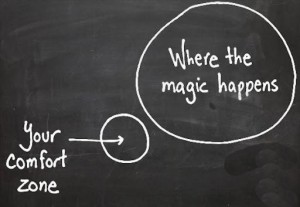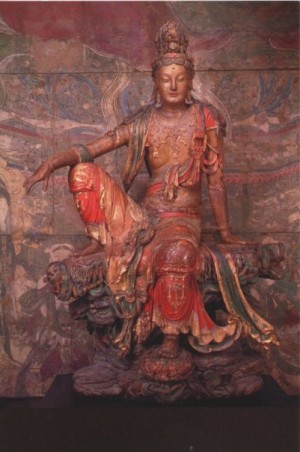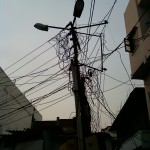In sharing impressions with my friends about the film Avatar, a number of them have expressed sentiments such as, “Oh, if only WE could live in such an attuned, loving, harmonious society as the Na’vi!” And in doing a little research for this blog, I find listed #2 in Google (with the search words “avatar movie”) the headline “The Avatar effect: Movie-goers feel depressed and even suicidal at not being able to visit utopian alien planet.”
This film actually touches something very real in us, and consequently exposes some of our deep longings — and wounds. Sometimes my response to the — call it what it really is, nostalgia — for the Na’vi’s state of harmony and indwelling sense of the sacred is to say, “Well, what is keeping YOU from moving towards living more that way?”
There is a chestnut from the Sufi master Hazrat Inayat Khan: “It is useless to discuss the peace of the world. What is necessary just now is to create peace in ourselves that we, ourselves, become examples of love, harmony and peace. That is the only way of saving the world and ourselves.” Gandhi says in the same vein, “Be the change you want to see in the world.”
The heart of the matter is that we are always looking outside of ourselves for the answers to perceived problems, and the real nature of many “problems” is thereby veiled from us by the viewpoint of our assessment. We seldom find fulfillment because we are “looking for love in all the wrong places.” Someone now wants to create a society modeled on the Na’vi, expecting that to have the qualities of the Na’vi we must first create an ideal society. It will fail, not because our human potentials are themselves lacking, but we think we need things outside our skins to be a certain way for us to experience certain things — with the inevitable corollary: If it doesn’t work, someone else is to blame. Those who create or join a community to get the family they never had pretty-much get the family they did have.
Let me suggest something: Our planet has been evolving for 5+ billion years, and in 1969 evolved to the point where it could launch a piece of itself into space, and look back and take pictures of itself and think about what it saw. Each of is an evolving node, not only of the planet but of Consciousness Itself. And each of us is invited into the next step of our personal evolution by primarily two things: Our need, and our longing.
Our need is a clue to what qualities and capacities we must develop to handle life situations with ease, fluidity, and a touch of style.
So if, for example, we are dealing with a bullying workplace supervisor who verbally trashes employees behind closed doors, we need strength (to set appropriate boundaries on what behavior we will accept) and clarity (to not accept a demeaning image of ourselves offered by the bullying supervisor). We may need to say, for example, “I will be happy to meet with you, but the door stays open.” If the supervisor says, “This could be contentious,” your response might be, “I am going to have a polite and professional meeting with you, not a contentious one.” Implicit or explicit in this supervisor’s communication is a demeaning message about your worth that is used manipulatively toward the supervisor’s purposes — but only if you accept it first. If your sense of worth is solidly in your own possession, no one can define you otherwise.
Every life situation in which we feel less-than, deficient, needy, or overwhelmed by the magnitude of what we’re faced with is our soul’s deep wisdom beckoning us into a greater unfoldment of our potentials. There is an inherent, divine guidance and wisdom that is inherent in the soul and which is in a sense choreographing our trajectory through manifestation. Your life’s problems are telling you about the next steps in your unfoldment toward the fulfillment of your life’s purpose. Your next step is to become the kind of person who does not have that particular kind of problem, and your task is to develop the qualities that will enable you to engage the situation with fluidity and integrity.
If you are repeatedly confronted in life with a certain kind of problem, be sure that you can engage it or you can avoid it, but you can not opt out. To attempt the latter is to lose more and more life force. On the other hand, the embodiment of the qualities and capacities being asked of you will rejuvenate and transform you and those around you in ways that are simply unbelievable from the standpoint of your current felt-sense and image of yourself.
Our longing, on the other hand, is a ladder to the inherent vision — the vision of our soul — that we have of our further possibilities. This is not just the qualities/capacities we need to engage life’s challenges. Our longing can help us find the “navigational fix” — the pole-star of our real being — which we need to live life creatively instead of crisis-to-crisis or as a series of problems to be solved. It is the soul itself drawing us forward to a vision of fulfillment that each of us brought with us and which was catalyzed by our first breath. It is the aliveness of life, not the repairing of life. It is not solving problems or healing wounds, it is our inherent wholeness unfolding our inner, spiritual inheritance more and more perfectly.
Fulfillment can indeed be realized — and at a level that reveals society’s quicksilver rewards and tinsel trappings to be completely devoid of value and substance — but the horizon of the vision recedes as we journey onward, drawing us with it.
I said above that we are invited into the next step of our personal unfoldment by primarily two things, need and longing. There is a third, and that is love. Not romantic love, or the love of and for our friends or children, but the love-without-an-object/love-beyond-form that is not “about” relationships but is the essence of all relationship, the very matrix in which we live and move and have our being. This is the love of which the mystics write. “Sultan, saint, pickpocket, love has everyone by the ear, dragging us to God by secret ways.” (Rumi) This love is mystery itself, but that does not mean that we cannot enter into it, surrender to it the way we lay ourselves down in the arms of our earthly beloved, and let it empty us of that which does not properly belong to us. Therein lies all the fulfillment the soul longs for, and out of which grows beauty, harmony, and a life that is both an expression of and a support for our continued unfoldment, both personally and collectively.
The harmony, sacredness, respectfulness, courage, and vibrancy of the Na’vi are already within us, or these qualities would not call to us so compellingly. If they were not already potentials within our own being, we simply would not perceive them, just as the soldiers and corporate management in the film are asleep to them. It’s not that we don’t have the qualities of the Na’vi, it’s that we DO have them, and our nostalgia for their world is our own heart/soul/spirit calling them forth from our depth.



